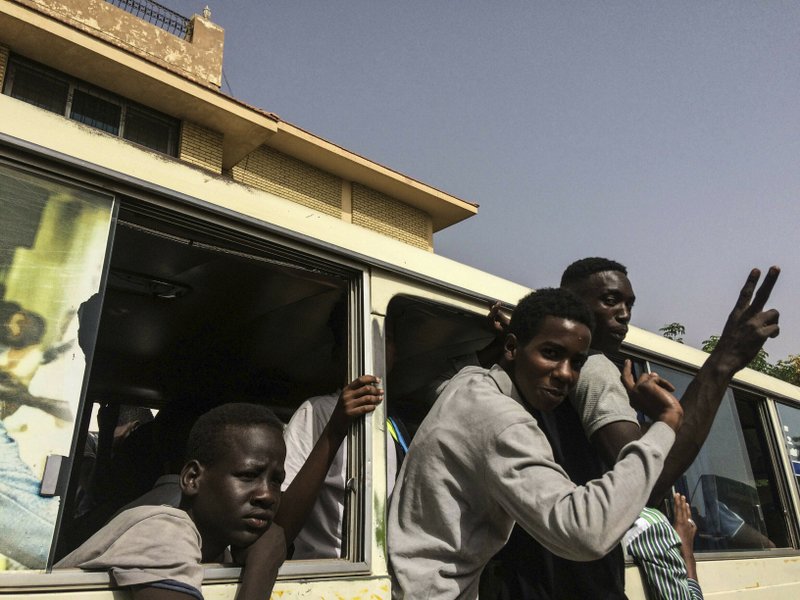CAIRO -- Sudan's military overthrew President Omar al-Bashir on Thursday after months of bloody street protests over his repressive 30-year rule. But pro-democracy demonstrators were left angry and disappointed when the defense minister announced the armed forces will govern the country for the next two years.
Al-Bashir's fall came just over a week after Algeria's long-ruling, military-backed president, Abdelaziz Bouteflika, was driven from power.
Together, the developments echoed the Arab Spring uprisings eight years ago that brought down entrenched rulers across the Middle East. But like those movements of 2011, the new ones face a similar dynamic -- a struggle over what happens after an autocrat's removal.
Protest organizers in Sudan denounced the army's takeover and vowed to continue rallies until a civilian transitional government is formed. Tens of thousands of demonstrators were massed at a sit-in they have held for nearly a week outside the military's headquarters in central Khartoum, the capital.
After the televised announcement of al-Bashir's arrest by Defense Minister Awad Mohammed Ibn Ouf -- who is under U.S. sanctions for links to atrocities in Sudan's Darfur conflict -- many protesters chanted angrily, "The first one fell, the second will, too!" Some shouted, "They removed a thief and brought in a thief!"
Ibn Ouf said a military council that will be formed by the army, intelligence agencies and security apparatus will rule for two years, after which "free and fair elections" will take place.
He also announced that the military had suspended the constitution, dissolved the government, declared a state of emergency for three months, closed the country's borders and airspace and imposed a curfew starting Thursday night.
In the wake of the coup, international human-rights groups urged Sudanese military authorities to hand over the 75-year-old al-Bashir to the International Criminal Court, where he faces charges of war crimes, crimes against humanity and genocide for his deadly campaign against insurgents in the country's Darfur region.
Amnesty International's secretary general, Kumi Naidoo, said al-Bashir is wanted for "some of the most odious human rights violations of our generation."
Al-Bashir, whose whereabouts were not immediately known, came to power in a coup of his own in 1989, backed by the military and Islamist hard-liners. He kept an iron grip on power and brutally suppressed any opposition while monopolizing the economy through allied businessmen.
Over his three decades in control, he was forced to allow the secession of South Sudan after years of war, a huge blow to the north's economy. He became an international pariah over the bloodletting in Darfur. And the U.S. targeted his government repeatedly with sanctions and airstrikes for his support of Islamic militants.
The street protests that started in December were met with crackdowns by the government that left dozens of people dead and eventually turned the military leadership against al-Bashir. Several times in the past week, army troops trying to protect the rallies exchanged fire with security forces.
The protests -- involving a mix of young activists, students, professional-employee unions and opposition parties -- were initially fueled by anger over the deteriorating economy but quickly turned to demands for the president's ouster and gained momentum last week after Bouteflika's resignation in Algeria.
Word of al-Bashir's removal emerged in the morning, when state TV announced that the military was about to make an "important statement," and two high-ranking officials said al-Bashir had been ousted. That prompted thousands of protesters to march toward the center of Khartoum, cheering, singing and dancing in celebration.
The announcement finally came hours later, from Ibn Ouf, a key power figure in al-Bashir's regime.
"I, the defense minister, the head of the Supreme Security Committee, announce the uprooting of this regime and the seizing of its head, after detaining him in a safe place," he said.
He denounced al-Bashir's government for "bad administration, systemic corruption, absence of justice," adding: "The poor became poorer and the rich became richer. Hope in equality has been lost." He also said al-Bashir's crackdown against protesters risked splitting the security establishment and "could cause grave casualties."
Mariam al-Mahdi, a leading member of the opposition Umma, called the military's takeover "a dangerous move."
"Our demands are clear: We don't want to replace a coup with a coup," al-Mahdi said.
A Section on 04/12/2019
